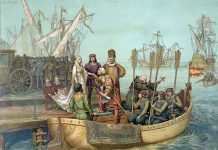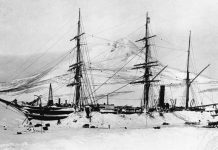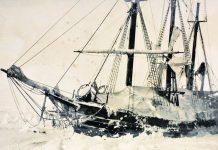It seemed that the polar Robinsons had no chance to survive, but they lived on a desert island year after year and were not going to die. When their clothes became dilapidated and began to literally spread out on the body, they sewed a new one from the skins of deer, arctic foxes and bears, using fish bones instead of needles, and animal veins instead of threads. The Robinsons defeated the polar darkness with the help of a homemade clay lamp, which was filled with animal fat.
After World War II, military robinsons appeared on a number of Pacific islands. They were Japanese servicemen. Some of them hid in the jungle, not even knowing about the end of the war, others did not accept the surrender of Japan and continued their war. For example, a Japanese sergeant was hiding in the jungle of Guam for 11 years and 7 months. And the former sergeant of the Japanese army, Suoichi Yokoi, hid in the jungle of the same island from 1944 until January 17, 1972, for almost 28 years! Yokoi settled in an unknown cave, ate edible roots, fruits of wild plants and fish. The record holder among the samurai Robinsons turned out to be former Lieutenant Hiro Onoda.he is about 30 years old, from the end of 1944 to March 10, 1974, he continued to fight, hiding in the jungles of the Philippine island of Lubang. To force the Japanese out of the jungle, I had to find his former commander. Only after hearing his order, Onoda ended his many years of robinsonade.
Finally, after six years and four months, the long-awaited day came when they saw a sail in the sea. In a matter of minutes, the Polar robinsons lit a bonfire on the shore, began shouting, waving their skins. From the ship of a Russian merchant, which was heading to Arkhangelsk, the islanders were noticed, a boat went to the shore.
When the polar Robinsons realized that the hour of the long-awaited salvation had come, tears rolled from their eyes.
The Pomors begged the skipper to give them time and the opportunity to transport all their possessions from the shore. Two hundred reindeer skins, more than two hundred skins of white and blue arctic foxes, bear skins and fifty pounds of deer fat were brought on board the ship. The Pomors even took everything they had managed to acquire — bows, arrows, a homemade lamp, needles, etc. On September 28, 1749, the rescued Pomors arrived in Arkhangelsk. The homecoming was almost overshadowed by tragedy. Alexey Himkov’s wife, who had been waiting for her husband for many years and met almost every ship, suddenly recognized her husband from afar, and rushed into the water to get to the ship faster. She almost drowned, fortunately, she was rescued.
The Pomors who returned to their homeland could not eat bread for a long period, their body did not accept flour. If they eventually began to eat bread, then they did not touch alcohol until the end of their lives. It is possible that, while on the island, they vowed never to touch the cup, if God would have mercy and send them salvation.
Mikhail Lomonosov, who regularly kept in touch with the motherland, was the first to learn about the extraordinary robinsonade and the courage of his countrymen.
I must say that the count’s tutor was not an easy one, but an academician… Frenchman le Roy was previously a member of the Russian Academy of Sciences, and after his dismissal joined the service of Shuvalov. At the behest of his “boss”, the Frenchman wrote the book “The Adventures of four Russian sailors brought to the island of Ost-Svalbard by the storm.” Thanks to this book, information about the feat of the Russian Pomors has reached us.
It should be noted that the British and Dutch stubbornly sought to colonize the islands of Svalbard and, in order to secure them for themselves, offered a lot of money to all their subjects who decided to live on them for at least a year. However, everyone considered such a “business trip” a real suicide, so the vacancies of the polar settlers remained unclaimed.
At the beginning of the XVII century, the British decided to secure the islands with the help of criminals sentenced to death. For a year of living on the polar islands, they were promised life. It would seem that all criminals should have enthusiastically accepted such a proposal, many actually agreed. But when the ship brought them to the gloomy rocky shores covered with snow, all as one refused to go ashore. The criminals decided that it was better to immediately lose their lives with the help of an executioner than to die for a long time and painfully in this snowy desert.
But the Russian Pomors, having in their initial “capital” only 12 bullets per gun and 20 pounds of flour, lived in the harsh conditions of the North for more than six years!








































